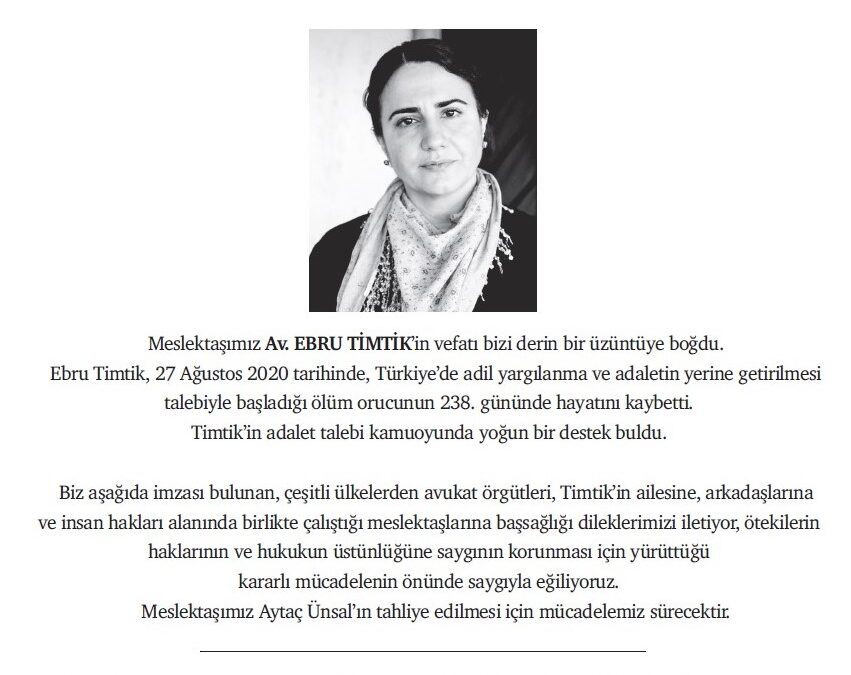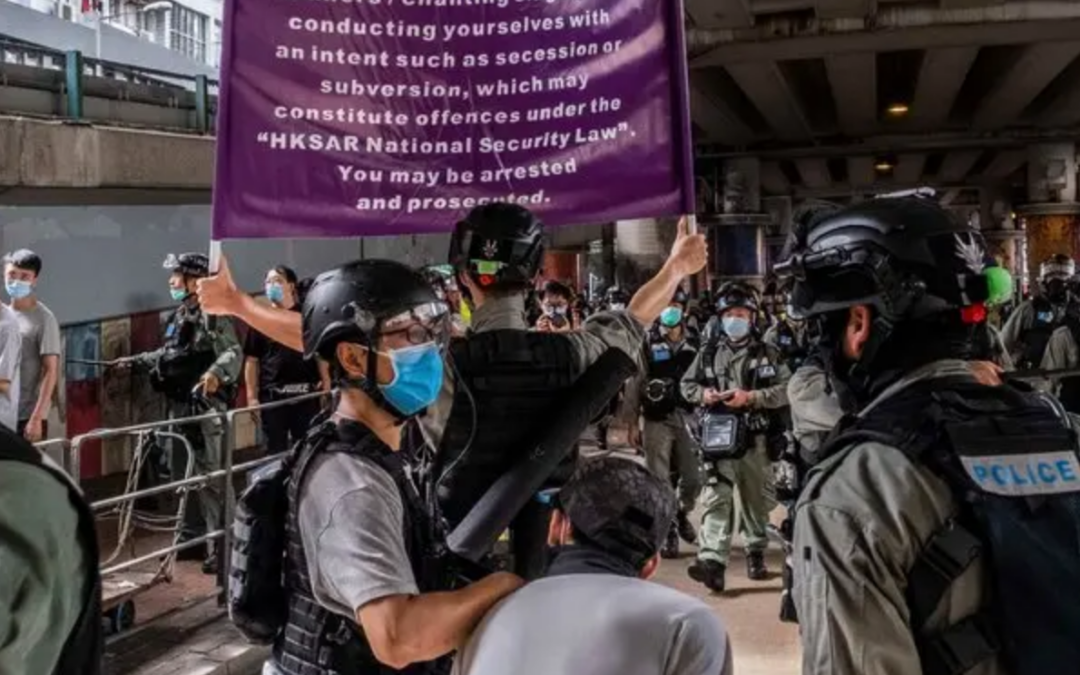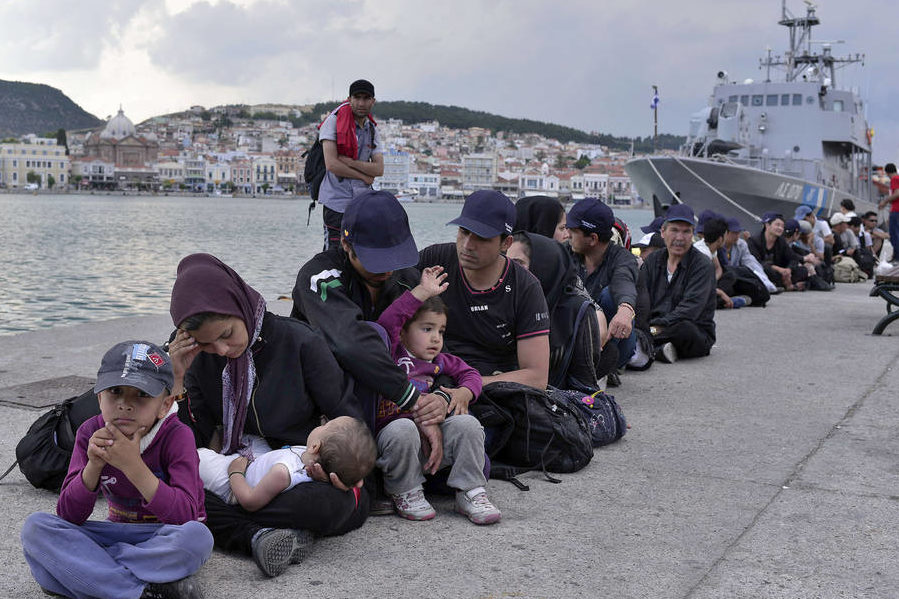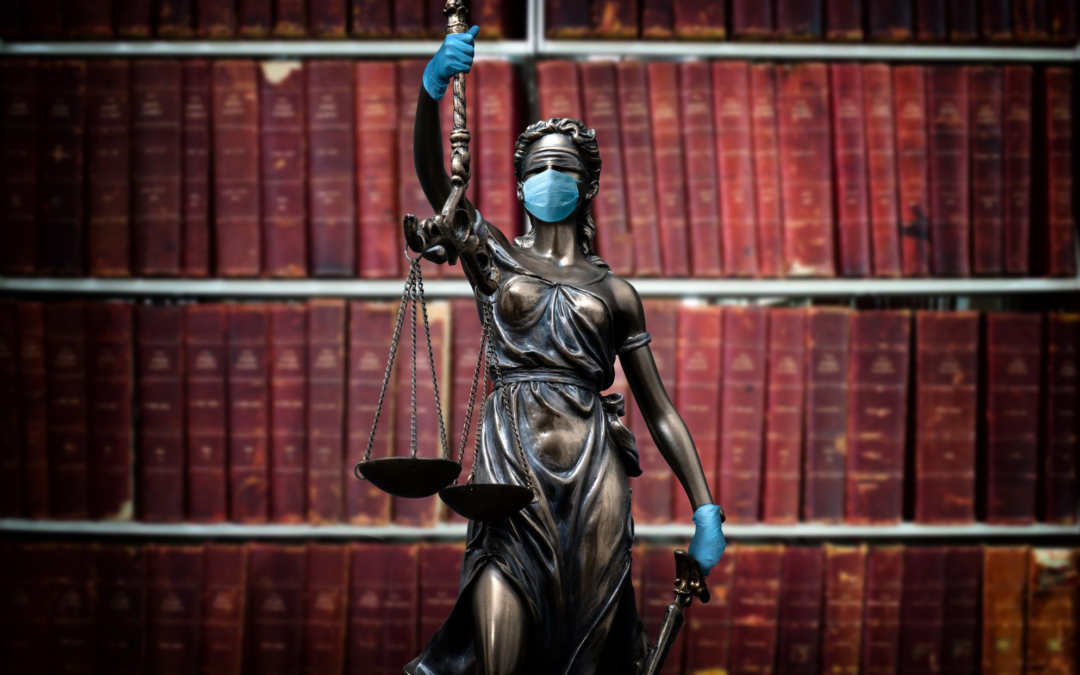
Sep 3, 2020
The ICJ has joined other lawyers and human defenders around the world in expressing deep sadness for the loss of human rights lawyer, Ebru Timkik, in an obituary posted in several Turkish newspapers.
The death of Ebru Timkik marks a further low in Turkey’s human rights record and occurred amidst a pervasive crackdown by the Government on the rule of law and human rights in the country and on lawyers, judges and prosecutors defending them.
On 2 September, nine special procedures of the UN Human Rights Council called for effective investigations into her death that was “entirely preventable” and urged Turkey “to release other human rights defenders.”
The text of the obituary in English states:
“Deeply saddened we are by the loss of our colleague lawyer EBRU TIMTIK. She passed away on 27 August 2020 after a hunger strike of 238 days, which she started to strengthen her demand for fair trials and the administration of justice in Turkey. Her demands for justice were supported by many.
We, the undersigned, lawyers organizations from all over the world would like to pay our condolences to her family, friends and colleagues with whom she worked on human rights issues and pay tribute to her determined work to protect the rights of others and promote respect for the rule of law. Our fight to secure the release of her colleague Aytaç Ünsal continues.”

Jul 9, 2020
Today, the ICJ called on Chinese legislators to repeal the new National Security Law for Hong Kong Special Administrative Region (SAR) and in the interim for the authorities to suspend the implementation of provisions that are incompatible with the rule of law and the State’s international legal obligations.
In an 11-point Q and A format briefing paper, the ICJ assesses a number of procedural and substantive concerns with the Law and its enactment, including its implication for the exercise of freedom of expression and other human rights, as well as the independence of the judiciary in Hong Kong SAR.
The Law was passed by the Standing Committee of the Thirteenth National People’s Congress (NPC) on 30 June 2020.
“The law’s creation of new security bodies with expansive powers, subject to little or no accountability or oversight, is a recipe for disaster. Given the recent history of police abuse in Hong Kong, we know that these provisions will be used to target human rights defenders and other activists, particularly those involved in the democracy protests,” said Frederick Rawski, ICJ Asia-Pacific Director.
“Arrests have already taken place in the few days since the law has come into effect. Without a right of appeal to an independent judicial body, and a near total lack of transparency, the threat of prosecutions under the law’s criminal provisions poses an existential threat to the rule of law.”
The briefing paper highlights the numerous ways in which it falls short of international law and standards, and raises concerns about its impacts on the protection of human rights and the rule of law in Hong Kong.
The ICJ stressed that the Law falls afoul of the UN Basic Principles on the Independence of the Judiciary and the Beijing Statement of Principles on the Independence of the Judiciary in the LAWASIA Region 1997. In addition, enforcement of the law would undermine the right to a fair trial by a competent, independent and impartial tribunal, guaranteed under Article 14 of the ICCPR. It is also inconsistent with the 1985 Sino-British Joint Declaration which stated that “the Hong Kong Special Administrative Region will be vested with executive, legislative and independent judicial power, including that of final adjudication.”
The ICJ is particularly concerned about the creation of a new national security body and a new police division with overly broad investigative and surveillance powers, but weak accountability mechanisms.
The briefing paper on the Law of the People’s Republic of China on Safeguarding National Security in the Hong Kong Special Administrative Region asks and answers the following questions:
Q 1. What is the historical context of Hong Kong’s special administrative status?
Q 2. What is the background to the national security legislation in the HKSAR?
Q 3. What are China’s human rights obligations in relation to the national security legislation?
Q 4. How is the new National Security Law structured?
Q 5. What are the key concerns regarding the procedural deficiencies in the law?
Q 6. What are the crimes and penalties under the new law and what are the key concerns?
Q 7. Is the right to a fair trial by an independent judiciary safeguarded in the law?
Q 8. What is the mandate of newly established security agencies?
Q 9. How does the law threaten to undermine freedom of expression in the HKSAR and abroad?
Q 10. What kind of powers do the police have under the new law?
Q 11. What does the International Commission of Jurists recommend?
Contact
Frederick Rawski, ICJ Asia and Pacific Regional Director, e: frederick.rawski(a)icj.org
Boram Jang, ICJ Legal Adviser, Asia & the Pacific Programme, e: boram.jang(a)icj.org
Download
Hong-Kong-National-Security-Law-Briefing-Paper-ENG-2020 (PDF)
See also

Jun 26, 2020
The ICJ publishes today a legal briefing on the impact of COVID-19 related measures on human rights of migrants and refugees in the EU.
Since January 2020, the Coronavirus pandemic has been spreading in Europe. As a result, all EU Member States have taken measures with the stated intention of containing the spread of the virus. These included restrictions on public gatherings, requirements to stay at home except for limited essential activities, and orders to close businesses and cultural and educational institutions. The most severe of these restrictions were in place between March and May 2020, which is the period covered by the paper.
In this period, some EU Member States closed their borders; stopped the registration and lodging of asylum applications; or freedom of movement in and out of reception centers was restricted. Many of these measures affected, often disproportionately, the rights of migrants and refugees.
The briefing paper considers some of these measures, their impact on the human rights of migrants and refugees, and their compliance with international human rights law. It touches in particular upon the following issues: (1) The impact of the closure of the EU external borders and suspension of new and on-going asylum applications; (2) Closure of internal borders and impact of COVID-19 measures on Dublin transfers and the right to family life; (3) Impact of COVID-19 measures on residence permits, right to work and access to health care; (4) Reception and living conditions and (5) Immigration detention.
You will find the briefing here.
The Legal briefing is published in the framework of the FAIR PLUS project funded by the European Union’s Justice Programme (2014-2020). The content of this publication represents the views of the author only and is his/her sole responsibility. The European Commission does not accept any responsibility for use that may be made of the information it contains.

Jun 24, 2020
Today, the ICJ published a briefing paper examining Israel’s failure to implement and comply with certain obligations under the International Covenant on Civil and Political Rights (ICCPR).
The briefing examines a number of human rights violations as they arise in the context of:
- Emergency regulations adopted by the Israeli Government during the COVID-19 pandemic;
- The establishment and expansion of settlements in, and the annexation of portions of, the Occupied Palestinian Territory;
- Excessive use of force in the context of Israel’s response to the “Great March of Return” in Gaza; and
- The accountability gaps within the Israeli military justice system.
In the paper, the ICJ recommends the Israeli authorities to undertake steps in order to improve compliance with the ICCPR, including to:
- Ensure that emergency regulations and any related derogating measures adopted with the stated intention of tackling the COVID-19 pandemic are fully consistent with article 4 of the ICCPR;
- Dismantle all the settlements and related infrastructure, including the “Separation Wall”, in the West Bank and East Jerusalem, and withdraw all settlers;
- End any conduct aiming at annexing parts or all of the West Bank, and refrain from taking legislative steps to that end;
- Ensure that the domestic rules of engagement governing the use of potentially lethal force are designed in accordance with article 6 of the ICCPR to guarantee the right to life and bodily integrity, and that Israeli security forces comply with them in practice;
- Transfer the institutional competence to investigate and prosecute alleged crimes under international law committed by members of the Israel Defence Forces from the Military Advocate-General to a civilian authority;
- Reform the laws and institutions governing the initiation of an investigation, and prescribe the opening of an investigation into all incidents involving the use of firearms by the Israel Defence Forces in the OPT, particularly when resulting in a potentially unlawful death or serious injury.
Download
Israel-ICCPR compliance-Advocacy-Analysis Brief-2020-ENG (full briefing paper, in PDF)

Jun 12, 2020
The ICJ published today a briefing paper outlining measures affecting the court system and access to justice which have been introduced in response to COVID-19 in Azerbaijan, Kazakhstan, Kyrgyzstan, Russia, Ukraine and Uzbekistan.
In any emergency or crisis situation, judicial oversight of the exceptional measures taken by the State is essential to the rule of law and the protection of human rights.
As anti-COVID-19 pandemic measures have affected many spheres of functioning of the State and society, they have affected justice systems to the extent that their normal operation was interrupted, suspended or adjusted to the new circumstances.
While such measures may have been seen as necessary to effectively tackle the pandemic, the limited operation of the courts, as well as limitations on access to legal advice, have implications for access to justice and the right to a fair trial.
They also raise questions of the capacity of the judicial system to provide redress for possible violations of human rights related to the pandemic and the consequent emergency measures.
In this regard, States’ obligations under international human rights law, which continue to apply in times of crisis, must be central to their COVID-19 response.
In this briefing paper, the ICJ outlines measures affecting the court system and access to justice which have been introduced in response to COVID-19 in a number of countries of the Commonwealth of Independent States (CIS), and which by their nature touch upon legal obligations of States under international human rights law, including the International Covenant on Civil and Political Rights (ICCPR), the International Covenant on Economic, Social and Cultural Rights (ICESCR), and for member States of the Council of Europe, the European Convention on Human Rights (ECHR).
In particular, in this paper the ICJ considers access to the justice and the court systems in Azerbaijan, Kazakhstan, Kyrgyzstan, Russia, Ukraine and Uzbekistan. It considers the issue of the legislative framework governing the restrictive measures, as well as the problems of access to lawyers and courts in relation to the COVID-19 restrictions.
This briefing paper should be read in conjunction with the ICJ’s general briefing note on COVID-19 and the Courts, which explains relevant international laws and standards in more detail.
Download
CIS-Justice and coronavirus-Advocacy-Analysis brief-ENG-2020 (full briefing paper in PDF)









